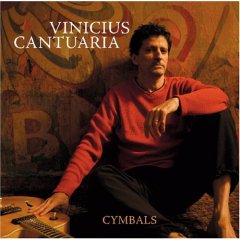Review by Brad Walseth
I credit alto saxophonist David Binney for turning me onto the world of modern Brazilian music. I'd always been a fan of the Getz/Gilberto '60s era samba and bossa sounds, and even admired Sergio Mendes' music, but really had no insight into what the ensuing decades have brought about in this music. Binney extolled the gifts of artists like Caetano Veloso, Gilberto Gil and Vinicius Canatuaria to me, and I find I clearly owe him a debt of gratitude for the world of sound that has opened up by discovering these modern Brazilian artists.
Case in point is Vinicius Cantuaria's intriguing new recording, "Cymbals." Dark and often brooding, Cantuaria has taken the basics of bossa and added in subtle sounds including modern electronics, a trait perhaps garnered from working with avant garde artists David Byrne, Brian Eno, Bill Frisell, David Torn, Arto Lindsay, Ryuichi Sakamoto and Laurie Anderson, to compliment the sound.
A top-notch supporting cast is used subtly and with excellent effect. Luscious piano is provided by Brad Mehldau, strings by Jenny Scheinman (violin) and Erik Friedlander (cello), trumpet by Michael Leonhart, percussion by Marivaldo Do Santos and additional guitar by Marc Ribot. Binney himself makes an appearance with an unusually relaxed alto sax solo on "Tu Cara." Meanwhile, Cantuaria sings in a soft yet effective voice, plays acoustic, seven-string and electric guitars, as well as percussion, including hi-hats and yes, cymbals, that effectively adorn his resonant guitar work.
Most of the songs are Cantuaria originals, but he pays tribute to Jobim with a quite lovely cover of "Vivo Sonhando," and also covers the lesser-known, up-tempo "Voce Esta Sumindo." Some highlights include the hypnotic opener "Galope," featuring Scheinman's violin (seen here locally last year with Bill Frisell), the haunting "Voce E Eu," with shimmering work from Mehldau and ominous dark cello, and the dancing "Chuva" with Leonhart's understated trumpet. Meanwhile, the final track, "To You" is a too-brief (like life itself) instrumental that sums up all the joy and sadness inherent in this genre of music. Full of surprises and little touches that sparkle like sunken treasure on a seabed, these songs are steeped in the Brazilian tradition, but with modern musical elements that should help to open the door of a great musical tradition to modern jazz fans.
|

